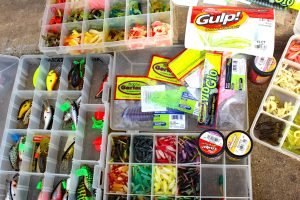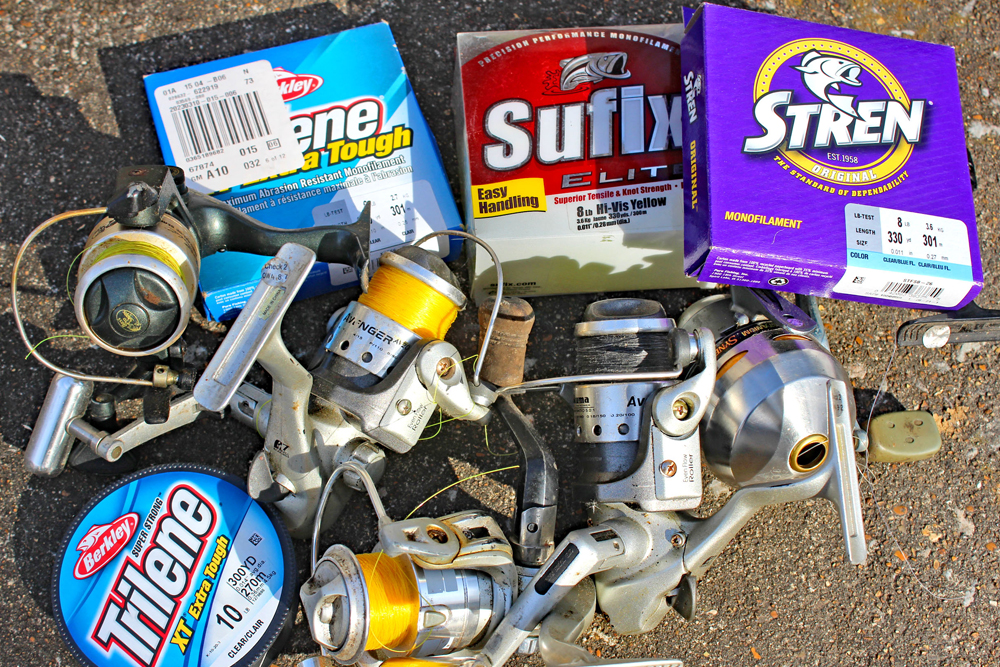Fishing line is the most important thing between you and the fish. String your reels with
new line and don’t cut corners by starting the fishing year off with last fall’s monofilament. (Photo: Steve McCadams)
Tune Up Your Tackle
by Steve McCadams
When winter winds howl and temps fall below normal, cabin fever spreads among the ranks of crappie fishermen. Pacing the floor, cooped up, claustrophobic and chomping at the bit to get out and about.

Sound familiar? We’ve all been there.
It is the perfect time to relieve that cabin fever by tuning up your tackle.
It can be distressing for a warm spell to trigger fishing fever, only to find your tackle still in a disarray from the last fall fling.
Does your boat look like someone held a yard sale in it? Rods thrown about. Lines still tangled. Jigs mangled and knotted. Reels in need of new line. Jig boxes look like someone took them to a bowling league tournament.
Been there and done that. That last fall outing had many of us in a hurry to hibernate. We had good intentions to straighten things up but procrastination is an evil mistress.
I must kneel before the court and admit my own guilt. Before someone calls and says the crappie are biting why not address some of the following issues that could delay and destroy your maiden voyage.
TUNE-UP TIPS:
- Perform a quick check of your boat trailer’s wheels, tires and brake lights. If the boat doesn’t make it to the lake, you won’t either. Best look close at wheel bearings and add grease. Check tires for tread wear and pressure. Brake lights are for safety AND to keep the boys in blue from potentially issuing a citation that would definitely put a damper on that first fun fishing trip.
- Always check your boat batteries. Are they full of fluid (electrolytes) and well-charged?
- A test start of the outboard is always wise. But never dry start your outboard. If you don’t already have them, the earmuffs you can hook to your water hose and wrap around your outboard’s water intakes are a mere $15, give or take. Chances are they will come in handy in the future as well. Or having your marine dealer conduct an overall inspection of your whole rig is never a bad idea and better to do it now when they probably aren’t as busy.

We often take rod holders for granted. But they can wiggle loose or become worn over time. It only takes a moment to insure they are mounted properly for whatever style of fishing you’ll be using, or worse yet, insure you don’t lose a rod overboard. (Photo: Richard Simms) - Now to the tackle: the list is long but the downtime is worse. Start by replacing line on all your reels. The most important thing between you and the fish is your line. Don’t cut corners here.
- Put a little oil on the reels and perhaps grease the gears. Check the bail springs and test the drags.
- Did the rods survive intact? Closely look at the rod tip and each individual guide as to cracks and alignment.
- If you use rod holders on your boat, check them all to be sure they are properly placed and secure.
- Devote time to categorizing the jig boxes, labeling them for quick access. Use a paint pen or duct tape to label boxes based on hair bodies, tube or solid body skirts or twister tails for casting.
- Separate the leadheads as to size and color. Separating skirt colors is a never-ending battle but it has to be done if you want to find that hot color quickly when the bite is on. Same goes for crankbaits if you’re a troller.
- Structure marker buoy strings and weights should be checked and replaced as needed.
- Keep pliers, hook sharpeners, split shots and replacement hooks sharpened, in working order and accessible.
- Turn on each of your electronic units to be sure they are functioning properly. Back up your GPS waypoints on a home computer. Keep extra batteries in the boat for hand-held units.
The greatest problem when kicking off the fishing and boating season is a failure of fishermen to take care of the basics. The fundamentals of fishing begin and end with simple steps we often overlook or neglect when warning signs appear.
Tomorrow comes but never arrives. There are no “instant replay” buttons when big slabs slip away because of bone head tackle malfunctions.

These ten tips don’t cover it all but can surely help the first day back on the water be more enjoyable if you devote some time and efforts to the suggestions mentioned.
If the motor doesn’t start remember to add fuel stabilizer to your tank and run the motor before storing it next fall/winter. Create your very own checklist later this winter if you put the boat in and things don’t go right.
Boats, motors, electronics and tackle have a way of playing tricks on the owner in the off season. Put them to bed working just fine in the fall and somehow a spell comes over everything as spring draws closer.
Resist the temptation to blow your own fuse before checking all those on the boat to see if perhaps that’s the source of some malfunctions.
The only way not to have tackle and boating issues is just not to have it. But then those days out on the lake when the sun warms your back, birds whistle, dogwoods bloom and slabs tug bobbers out of sight or thump that jig the boat is the place to be.
Your own floating castle and tackle store in arm’s reach. It is indeed a bundle of joy but good fishing tackle, boats and motors are expensive and merit responsibility.
Don’t turn a blind eye to the long list of little things that, if neglected, turn into big problems when out on the water. The fish will exploit your weaknesses and show no pity!
Steve McCadams is a professional guide and outdoor writer from Paris, Tenn. near Kentucky Lake. A member of The National Fresh Water Fishing Hall of Fame and Legends of the Outdoors he’s been under the spell of the great outdoors for more than 60 years.



